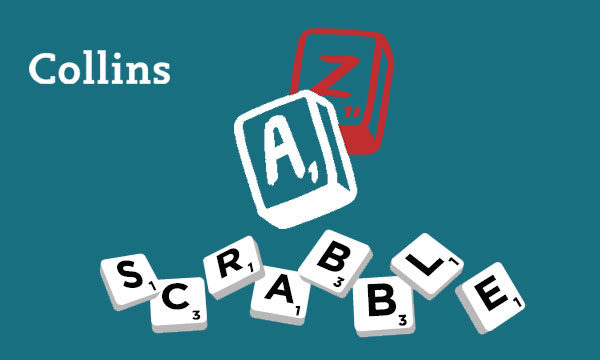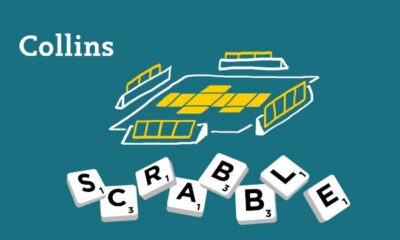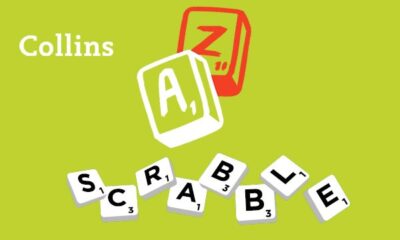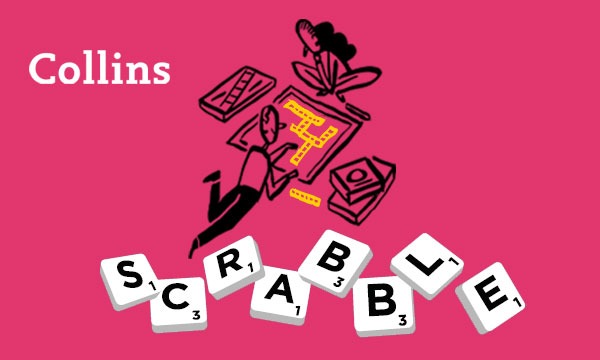Although Scrabble played the standard way is an endlessly varied game in itself, below are a number of alternative methods of play including stacking, foreign languages, and even a quizmaster to test your board game brainpower.
So, why not challenge yourself and a fellow Scrabble addict to a game of Clabbers, or gather a group for a game of Quizzify to really test your word knowledge, strategy skills – and perhaps your luck too!
Don’t forget, you can check your scrabble words (and those of your Clabbers opponent) with the Collins Dictionary Scrabble Checker.
1. Clabbers /Anagrams
The rules are identical to Scrabble except that all words played must be anagrams of real words. Also, the ‘double challenge’ rule applies – which means that you can uncover any poker-like bluffing by challenging your opponent to reveal the “real” word that the anagram makes.
2. Take Two
Take Two (also called Speed Scrabble or Bananagrams) is played without a board. All tiles are placed face-down in the middle of the players, each of whom is given seven face-up starting tiles to build their own valid Scrabble grid. When a player successfully uses each of his or her face-up tiles, they must shout “take two” and every player takes two more tiles. Once all the tiles have been taken, the first person to use all of his tiles and complete his puzzle is the winner.
3. Polyglot
In tournament Polyglot Scrabble, originally developed for the American Translators’ Association, you can play words in whatever language you like.
4. Ramifications, Stacking Scrabble or DIY ‘Upwords’
Here, creating new words by stacking tiles upon existing letters is allowed – so long as all words on the board remain valid. You can introduce a penalty to the player in whose turn a pile collapses, such as deducting any points gained via the now fallen letter tower.
5. Fours
Only four tiles can be placed on the board during any one move, yet words of any length can be made by hooking onto words already on the board i.e. adding BOOK to SHELF for BOOKSHELF. You can adapt the rules by limiting play to four letter words, or you can alter the game to ‘Fives’ or ‘Threes’.
6. Kajawah
This game is like any other Scrabble game except that before starting play all players agree on a target word, such as KAJAWAH (a camel’s litter). As soon as the word is played – for an extra 50 point bonus – the game stops and whoever has the most points wins.
7. Nouns
This is played just like any standard Scrabble game with two exceptions: you may only play nouns, and you gain bonus points when playing proper nouns which are also valid Scrabble words – such as CANADA (a type of goose) or SANDWICH (an area in Kent, as well as a Scrabble session snack).
8. One Two Three
Here, each player can only play a single letter in their first move, two letters in their second move, then three four, five, six, and finally seven. Each word’s score is multiplied by the number of tiles, i.e. if you have just played the word BE then you receive the standard 4 points, multiplied by 2 (number of tiles played), giving a final score of 8 points.
One Two Three can produce unbelievably high scores, for example the 1295 points once scored by Mike O’Rourke for the word LIKEABLE.
9. You follow me
Each word played must “follow” the previous word, for example following CAMERA with a word starting with A. This train of letters continues until a player’s move hits the edge of the board or is impossible to follow, at which point a new train is started with any of the other letters in the most recently played word.
10. Solitaire Scrabble
Solitaire Scrabble can be played alone and against a clock, trying to get the most points in a certain length of time or for highest maximum score.
11. Tag Team
This variant is played with two teams of two, with each player possessing their own rack. For each team’s turn, one of the players makes a play and is followed immediately by the teammate.
Teams can form set ups – for example the 302 point triple-triple word score achieved at the 2010 National Scrabble Championship’s Tag Team Tournament for the insecticide, MENAZONS.
12. Quizzify
This game is best played between two teams, each having their own team rack, and with one quizmaster.
Each team member in turn is asked a quiz question, and if they answer correctly – without having consulted their team members – they can play a word. General play is the same as in standard Scrabble, however if a team (somehow) manages to play the word QUIZZIFY then they automatically win the match!
13. Weird Words
Players can freely use a dictionary to find and define any word which closely matches their letters – this game is not really about winning points, but about expanding your vocabulary.
14. Xcrabble (or Diagonal Scrabble)
This is exactly like a standard game of Scrabble except that words are only played in downwards diagonals. Tip: you must watch out that you are not making gibberish words in other diagonal directions!
15. Team Speed Scrabble
Team Speed Scrabble is when teams of 2, 3, or 4 race to play legal Scrabble words as quickly as possible. Scoring does not matter; all that matters is speed!
16. Bel-crabs
As its name suggests, with this variation any word of more than three letters must be made up of two or more smaller words. Therefore, the word RESTRAIN is valid since it breaks down into the words REST and RAIN, although other more common words such as TABLE would not be allowed.
All opinions expressed on this blog are those of the individual writers, and do not necessarily reflect the opinions or policies of Collins, or its parent company, HarperCollins.



